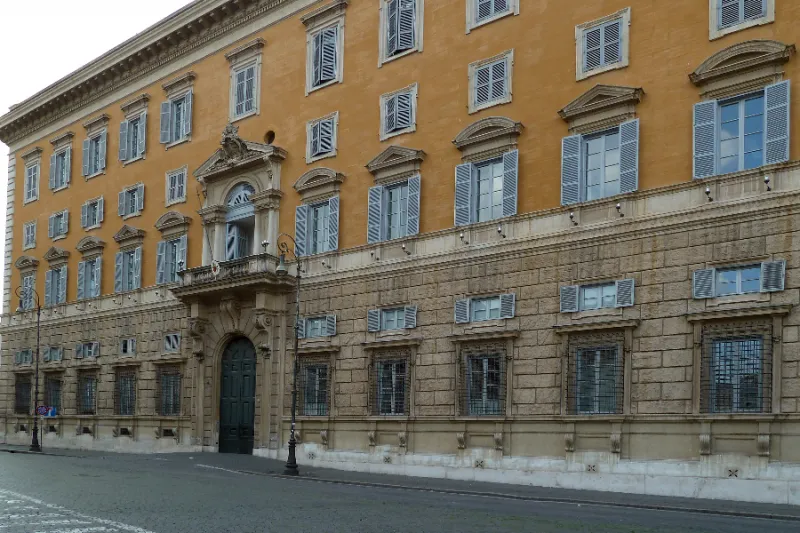
Vatican City, Dec 7, 2021 / 10:00 am (CNA).
Pope Francis updated Tuesday the Congregation for the Doctrine of the Faith’s procedural norms for the most serious crimes, including schism, sacramental desecration, and abuse of minors.
The pope promulgated the new adaptations to the “Norms on the delicts reserved for the Congregation for the Doctrine of the Faith” on Dec. 7, the day before the revision of Book VI of the Code of Canon Law goes into effect.
The definition of the delicts, or crimes, themselves have not been changed. But the new version of the norms aligns with the revisions to Book VI, as well as recent laws Pope Francis has issued, including his motu proprios As a loving mother and Vos estis lux mundi.
The new norms now also include the possibility of the pope decreeing the dismissal from the clerical state directly, without a trial, in cases of crimes against the faith, such as heresy, apostasy, and schism.
The “Norms on the Delicts Reserved to the Congregation for the Doctrine of the Faith” were promulgated by John Paul II in 2001 and amended by Benedict XVI in 2010.
In addition to the crimes against the faith, the doctrinal congregation also judges crimes against the sacraments, including the desecration of a consecrated host, simulation of the Mass, solicitation to a sin against the sixth commandment during confession, and violation of the seal of confession.
Other grave delicts included in the norms are the attempted ordination of a woman, clerical abuse of a minor, and the possession of child pornography by a cleric.
“The changes that have been introduced mostly concern procedural aspects, aimed at clarifying and facilitating the proper conduct of the Church’s legal workings in the administration of justice,” reported Vatican News.
The major revisions to Book VI of the Code of Canon Law, which covers penal law in the Church, including sanctions related to clerical sexual abuse, go into effect on Dec. 8, the Solemnity of the Immaculate Conception.
The revisions were first commissioned by Benedict XVI to improve the efficacy of the code’s penal sanctions.
Speaking after the revisions were published, Msgr. C. Michael Padazinski, president of the Canon Law Society of America, said: “This reinvigoration of canon law is a welcome necessity to our member canonists’ work on behalf of the Church and will be, as the Holy Father says, an instrument for the good of souls.”
“Recategorizing the crime of sexual abuse of a minor from a delict against celibacy to a delict against the dignity of the human person is a remarkable development. It shows a shift from a mindset of concern focused primarily on an accused cleric to a concern for the individual who has been harmed,” he said.
Padazinski also highlighted the significance of the revisions coming into effect on the feast of the Immaculate Conception.
The date “reaffirms that life itself and the protection of human dignity begin at the instant a child is conceived in the mother’s womb,” he said.
If you value the news and views Catholic World Report provides, please consider donating to support our efforts. Your contribution will help us continue to make CWR available to all readers worldwide for free, without a subscription. Thank you for your generosity!
Click here for more information on donating to CWR. Click here to sign up for our newsletter.





“The new norms now also include the possibility of the pope decreeing the dismissal from the clerical state directly, without a trial, in cases of crimes against the faith, such as heresy, apostasy, and schism” (Courtney Mares for CNA).
+That this proposed canonical statute is still under consideration speaks to the looming negative effect of a direct judgment on a priest’s clerical state, dismissal, absence of trial on such aggravated and contentious issues in today’s Church. It certainly strikes fear in clerical hearts not knowing if someone will report a false narrative resulting in sudden unexpected dismissal. That considering the doctrinal ambiguity stemming from this pontificate is precariously subject to abuse of authority.
+It seems more than a shot across the bow, rather a reeducation camp enclosure placed over clerics to behave and follow camp regulations.
+I would hope Msgr C Michael Padazinski, president of the Canon Law Society and other canon lawyers modify this proposed canon to include a trial process as has been Church policy. I almost thought His Holiness was adversarial to highly restrictive rules. Although, perhaps this canon is not his invention. For the good of the Church and faithful clergy it should be scrapped.
“The new norms now also include the possibility of the pope decreeing the dismissal from the clerical state directly, without a trial, in cases of crimes against the faith, such as heresy, apostasy, and schism” (Courtney Mares for CNA).
Well, that will certainly come in handy for dealing with any pushback against “Traditionis Custodes”!
I do not believe that critics of TC are guilty of crimes against the faith such as heresy, apostasy and schism. Unless, of course, if anyone follows in the footsteps of the defiant Archbishop Marcel Lefebvre.
Courtney Mares, you are a genuine reporter. You do not inject your personal opinions into your presentations of this nature. It gives us, the readers, to come to our own conclusions. Keep it up.